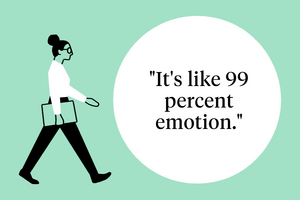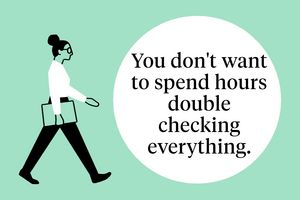Yes, there are those rare moments when you need to act quickly on an opportunity, lest it pass you by forever. But most decisions aren’t like that. By slowing down, we generally gain valuable perspective and make better decisions.
Here are five ideas from Kellogg research that show why—and how—to let go of here-and-now demands and cultivate patience and long-term thinking.
The quick fix isn’t always the right one.
When there’s a problem, many of us think we should take fast, decisive action—but those actions can backfire.
For example, when a company is underperforming, many boards take a seemingly sensible action: cut the CEO’s pay. Such a move, the thinking goes, will encourage the CEO to improve the company’s performance in order to restore his or her full pay.
But pay cuts can backfire, says accounting professor Swaminathan (Sri) Sridharan. In fact, Sridharan found that CEOs whose pay was docked at least 25 percent were likely to use a combination of both accounting techniques and opportunistic economic decisions that produce overly positive financial reports to accelerate the company’s reported performance in the short term.
These techniques, known as earnings management, can provide the appearance of a financial turnaround. But, Sridharan and coauthors find, earnings management can actually damage the company’s long-term profits.
The motivation is understandable. “Boards also want to be seen as being responsive,” Sridharan says. “The market, in its myopia, wants everything to be corrected today. But the larger the ship, the longer it takes to steer it back on course.”
Sometimes, the right long-term decision can look like a bad short-term decision.
When companies are filling management positions, it’s tempting to hire the person with the exact right experience. But than can be a mistake, according to research by Daniel Barron, an associate professor of strategy at the Kellogg School, and Michael Powell, an associate professor in the same department. Sometimes it might be in a firm’s interest to promote the (seemingly) “wrong” person or sign a contract with the “wrong” supplier.
That’s because firms need to build credibility with workers. According to a theoretical model developed by Barron and Powell, a firm’s credibility—and thus its ability to motivate excellent performance—comes from rewarding past successes. Otherwise, there’s no reason for workers to give their best.
“That means from the perspective of today, I’m going to be doing stuff that’s really weird,” Barron says. “I may be promoting someone that I know is not going to be that great of a manager. But I need to because that’s the only way to credibly reward them for their past efforts.”
Short-run thinking can often contribute to corner-cutting—or even outright delinquency. But research by Loran Nordgren, a professor of management and organizations, has found that thinking of your future self can help curb this tendency.
In one experiment, Nordgren and several colleagues used a letter-writing activity to connect people to their future selves. Half of the participants were given five minutes to write a short letter to themselves in 20 years, and the other half, to themselves in three months.
After completing the letter, participants were then presented with various hypothetical scenarios. For example, one posed, “You need a new computer, but you are short on cash. A fellow student tells you about an acquaintance of his who sells laptops that ‘fell off a truck.’ The laptops meet your requirements and are very attractively priced. How likely is it that you would buy one of these potentially stolen laptops?” Similar scenarios brought up dilemmas about theft, insurance fraud, and illegal downloading.
As the researchers predicted, those people who wrote to their distant future selves were less likely to say ‘Yes’ to the potentially stolen computer (or make other ethically questionable decisions) than those who had written to themselves three months from now.
So if you find yourself moving a little too fast, stop and think of that years-down-the-line you. Your present and future self will thank you.
None of us is getting any younger—and many of us have the perception that brilliant ideas are linked to youth.
But that’s not always the case, according to Benjamin F. Jones, a professor of strategy.
“If you look at age and great achievement in the sciences in general, it doesn’t peak in the twenties,” he says. “It’s more middle-aged.”
In fact, in a 2010 study, Jones found that scientists are having their breakthrough successes later and later in life.
The age at which a researcher achieves “great achievement”—such as a Nobel Prize–worthy discovery—trended up by between five and six years across the twentieth century. The age at which scientists obtain their PhDs has also trended up proportionally.
“As our understanding gets deeper, it takes people longer to get to the knowledge frontier from which they can step forward,” Jones says. In other words, there’s more to know now than ever before—and it’s OK to give yourself time to learn it.
Even in Silicon Valley, the perceived land of the wunderkind, innocence doesn’t necessarily beat experience.
Jones and several colleagues found that contrary to popular thinking, the best entrepreneurs tend to be middle-aged. Among the very fastest-growing new tech companies, the average founder was 45 at the time of founding. Furthermore, a given 50-year-old entrepreneur is nearly twice as likely to have a runaway success as a 30-year-old.
“Experience can bring substantial insight about specific markets and specific technologies, in addition to skills at running things,” Jones says.
So, there’s no rush. Letting your ideas age might actually improve them.




